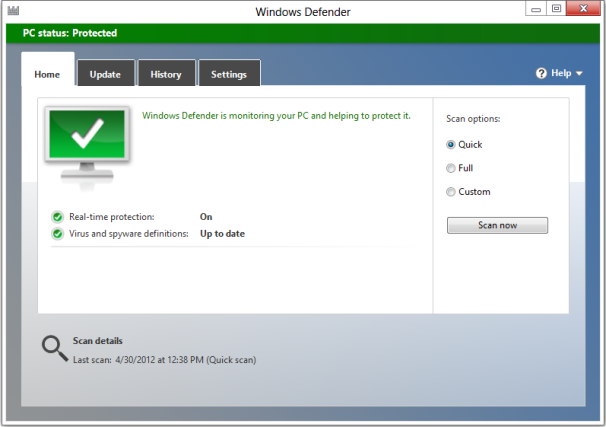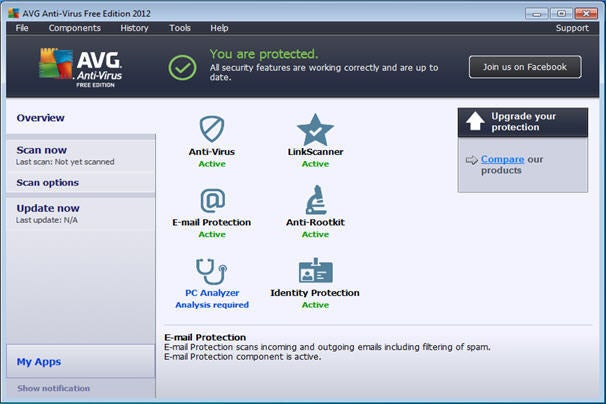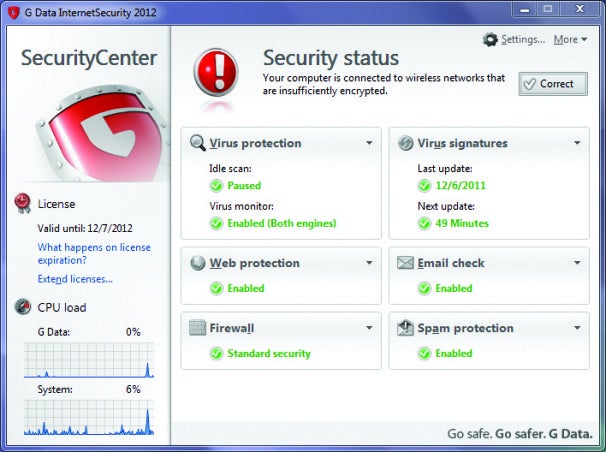Windows 8 will come with bundled antivirus software, but will you
need to supplement it with other programs? We look at some of your
options.
Microsoft will include antivirus in Windows 8
for the first time in the history of Windows. But will this
software--the new version of Windows Defender--provide adequate
protection against viruses, spyware, and other malware? Let's take a
closer look at what Windows Defender provides, and whether its features
are enough to keep you safe.
Bear in mind that even though Microsoft will include Windows Defender
in Windows 8, PC manufacturers may disable the program on new PCs that
carry preinstalled antivirus software from a third-party such as Norton
or McAfee. The preinstalled third-party antivirus options are usually
limited-time trials, so your initial decision may be whether to keep any
preinstalled antivirus; if you decide against keeping it, you'll need
to decide whether to enable Windows Defender and use it or to switch to
another third-party antivirus program.The most important thing to consider when choosing antivirus software is its protection strength--how well it detects, disables, and removes viruses, spyware, and other malware. In this article I'll focus on comparing the protection strength of Windows Defender to that of other antivirus programs.
Protection Strength of Windows Defender
 Windows Defender in Windows 8 looks a lot like Microsoft Security Essentials.
Windows Defender in Windows 8 looks a lot like Microsoft Security Essentials.Though we haven't fully tested Windows Defender in Windows 8 yet, we have tested Microsoft Security Essentials, which uses the same antimalware engine as Windows Defender.
Windows Defender and Microsoft Security Essentials also have very similar interfaces. Consequently, using the results from the existing Security Essentials review for a casual comparison seems reasonable. Security companies regularly update their products, and the results you obtain with the most recent iteration of each package could very well differ from those discussed here, but the earlier data does give us a rough idea of how Security Essentials and Windows Defender match up to their competition.
In a roundup review that we posted three months ago, based on evaluations that we conducted in conjunction with AV-Test, a well-respected antivirus-software testing lab, we appraised the performance of seven free antivirus programs. In this group, Security Essentials placed fifth. Our reviewers found it easy to use and deemed it the best of the seven at completely removing malware that it uncovered; but they also found its malware detection rate rather lackluster: It spotted 97 percent of known malware samples, whereas programs turned in detection rates as high as 99.9 percent.
To compare the protection strength of Security Essentials to that other free and paid antiviruses, you can refer to AV-Test's website for its latest testing results. Those results, at this writing, show that Security Essentials provides great malware repair and removal: placing third, just behind Bitdefender and Kaspersky. But the program's results for malware detection are much worse: It placed 21st in a field of 22.
Additional Free Antivirus Options
If you'd like to save some money, but prefer to use some other program, you have quite a few options. Again, I'll refer to our roundup review from last April, which evaluated seven free antivirus suites. Here are the top four you might consider using: AVG Anti-Virus Free Edition was the highest-ranked of the seven free antivirus programs we assessed earlier this year.
AVG Anti-Virus Free Edition was the highest-ranked of the seven free antivirus programs we assessed earlier this year.AVG Anti-Virus Free Edition: Though it had the lowest detection rate of the top four free antivirus programs with a 98.7 percent detection rate against known malware (Avast, Panda, and Avira finished with rates of 99.1 percent, 99.9 percent, and 99.7 percent, respectively), it handily outperformed Security Essentials (which finished with a detection rate of 97 percent). And though it wasn't as good at completely removing malware as Security Essentials (66.7 percent versus 80 percent), it was the only antivirus to disable 100 percent of detected malware; Security Essentials finished at 93 percent on this measure. AVG Anti-Virus Free Edition also tied Panda Cloud Antivirus for the top rate of blocking brand-new threats, at 85.7 percent, whereas Security Essentials was at 71.4 percent.
Avast Free Antivirus: Avast's freebie provided strong detection of known malware samples, at 99.1 percent. Its rate of completely removing malware (67 percent) fell short of Security Essentials' rate (80 percent) and the two programs delivered matching 93 percent rates for disabling active malware. Avast Free Antivirus did provide better blocking of real-world malware, achieving a 78.6 percent rate, compared to Security Essentials' 71.4 percent.
Panda Cloud Antivirus: This tool provided the second highest protection against known malware samples overall at 99.9 percent, compared to 97 percent by Security Essentials. Though Panda's malware repair percentage was among the lowest in the group of seven, it tied with AVG for the best performance at fully blocking brand-new threats, turning in a rate of 85.7 percent, versus Security Essentials' mark of 71.4 percent.
Avira Free Antivirus: Avira provided the third-highest detection rate (out of seven free antiviruses tested) for spotting known malware samples: 99.7 percent, compared to Security Essentials' rate of 97 percent. Though it scored lower than Security Essentials on AV-Test's remaining detection and repair tests, Avira did provide much faster scanning.
Paid Antivirus Options
Though free antivirus programs can provide adequate protection for most users, the best protection must be bought. To compare these, I'll refer to a roundup review of paid security suites that we posted in January of this year. Here are the top four programs you might consider purchasing, with their prices for one year of protection on three PCs lited parenthetically: G Data InternetSecurity 2012 earned the top ranking among paid antivirus programs in our January roundup.
G Data InternetSecurity 2012 earned the top ranking among paid antivirus programs in our January roundup.G Data InternetSecurity ($45): Among 14 paid packages tested, G Data Internet Security provided the best protection against known malware with a 99.99 percent detection rate. At the same time, it had minimal impact on PC performance, and an acceptable complete malware removal score of 60 percent.
Norton Internet Security ($50): This program delivered solid detection of known malware, at 99.94 percent, but it suffered from a higher-than-average false-positive rate and a relatively low malware removal mark of 50 percent.
Bitdefender Internet Security ($80): Bitdefender turned in the second-highest malware detection rate among paid programs, at 99.96 percent, and it also distinguished itself with a very good removal rate (90 percent), but its scan speeds tended to be slow, and the software had a relatively large impact on PC performance.
Kaspersky Internet Security ($65): Kaspersky's paid antivirus software combined good malware protection (at 99.34 percent) with an acceptable malware removal rate of 60 percent.
When you buy an Internet Security suite, in addition to getting better protection, you usually get more features and services than you would with a free antivirus program. For example, most Internet Security suites include a firewall to help block intrusions and data theft (these firewalls tend to be better than the free firewall built into Windows), as well as a spam filter to help you control your junk email. Many security software vendors offer tech support for removing malware if you do become infected, and they may provide additional security features such as sandboxing, and even extras like online storage or PC tune-up utilities.
Choosing Your Antivirus for Windows 8
If your Windows 8 PC comes with a third-party antivirus preinstalled on it, you should first check the program's ranking; if it doesn't rank in the top four, consider opting out and using something else. As we've seen, the free antivirus built into Windows 8 should be easy to use and should provide excellent malware removal, but it will likely be relatively weak at detecting malware in the first place.Though Windows Defender will still certainly protect you from most malware and may be suitable for some users, you may prefer to install on of the better-performing free antivirus programs offered by AVG, Avast, Panda, and Avira. Or for superior protection and more features, consider buying antivirus protection from one of the top vendors: G Data, Symantec (Norton), Bitdefender, or Kaspersky.
Ref:Pcworld
Microsoft Support | Microsoft Software Support | MS Office 2010
ReplyDeleteCall us at We24Support microsoft support number at 1 888 399 9656 and We provide 24/7
microsoft support to solve issues related to Microsoft software by certified expert.